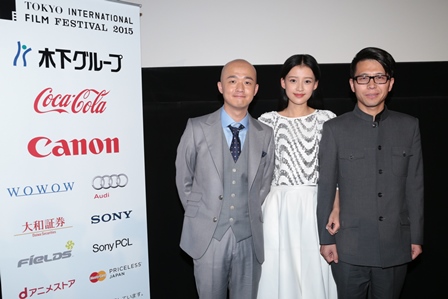
Given the fact that many of the works in the Competition section are by new or relatively unknown directors, it’s understandable that a good number of them over the years have been coming-of-age films. My Original Dream is Chinese director Hao Jie’s third movie, though it is so fresh that feels like his debut, and during the post-screening press conference he readily admitted that “85 percent of the story was based on my own experience.”
That experience, specifically, is one that everyone can identify with: first love. Set against the academic environment of China during the late 80s and early 90s, the movie charts the sentimental education of Zhao Shanshan (Bao Beier), the only son of a rural couple who aspire to something more than their difficult hand-to-mouth existence through the success of their offspring. Shanshan manages to get into the local middle school, where he immediately forms a crush on the demure Li Chunxia (Sun Yi), who is in charge of the flag during school functions and is the apple of pretty much every adolescent male’s eye. Obviously, Shanshan has competition, mainly from the corps of townie ruffians who extort money from the students as they commute to school on foot, but Shanshan makes friends with the Four Kings, a quartet of fellow students who stand up to the gang and protect him; that is, until he makes clear his feelings for Li Chunxia, thus becoming a double outcast, since it is not only against school policy to “date” but his classmates think he is longing for something above his station. Nevertheless, he and Li carry on a forbidden, clandestine love affair, until his parents, the school, and the ruffians find out.
My Original Dream is blunt in its depiction of adolescent sexual desire (lots of stuff about sex dreams and male fixation on menstruation) but non-explicit in its presentation of sex itself. As such, it often comes across as a light comic, but in the long run, Shanshan’s obsession with Li leads to his decision to become a director, a development that is addressed perhaps a bit too abruptly – the desire to film his story seems to be enough to gain him entry to the Beijing Film Academy – but in any case gives the movie its structure.
The assembled press was surprised by Bao’s shaved dome, since he sports a full head of hair in the movie and thick-framed glasses. He explained that, “like my father,” he has always shaved his head. “I wore a wig during the shooting,” he admitted. “Still, I hope you will refer to me as a good-looking actor.”
His previous two films have been shown in Japan, this was his first time at TIFF. He explained the film that it depicts his adolescent period and it overlaps with the historical steps of China as a country, so the film has two perspectives- from his own and the country itself.
Most of the questions had to do with specific plot points in the movie that seemed to require some firsthand knowledge of China’s social and educational systems in order to be fully appreciated. Hao said that it was relatively easy to make such a movie in China now because youth films were popular, even if they were set in an era that most young people today don’t know about. In fact, all three of his films are about young people and set in the past.
In that regard, one reporter’s question was particularly relevant. Remarking on the fact that while Shanshan was portrayed by two different actors, Sun Yi played Li in all her incarnations, including the one in middle school. She said portraying a girl that young wasn’t so difficult, but sometimes she had problems with her counterpart, who was barely out of elementary school. “He was so short,” she said with a laugh.
[Philip Brasor]






















